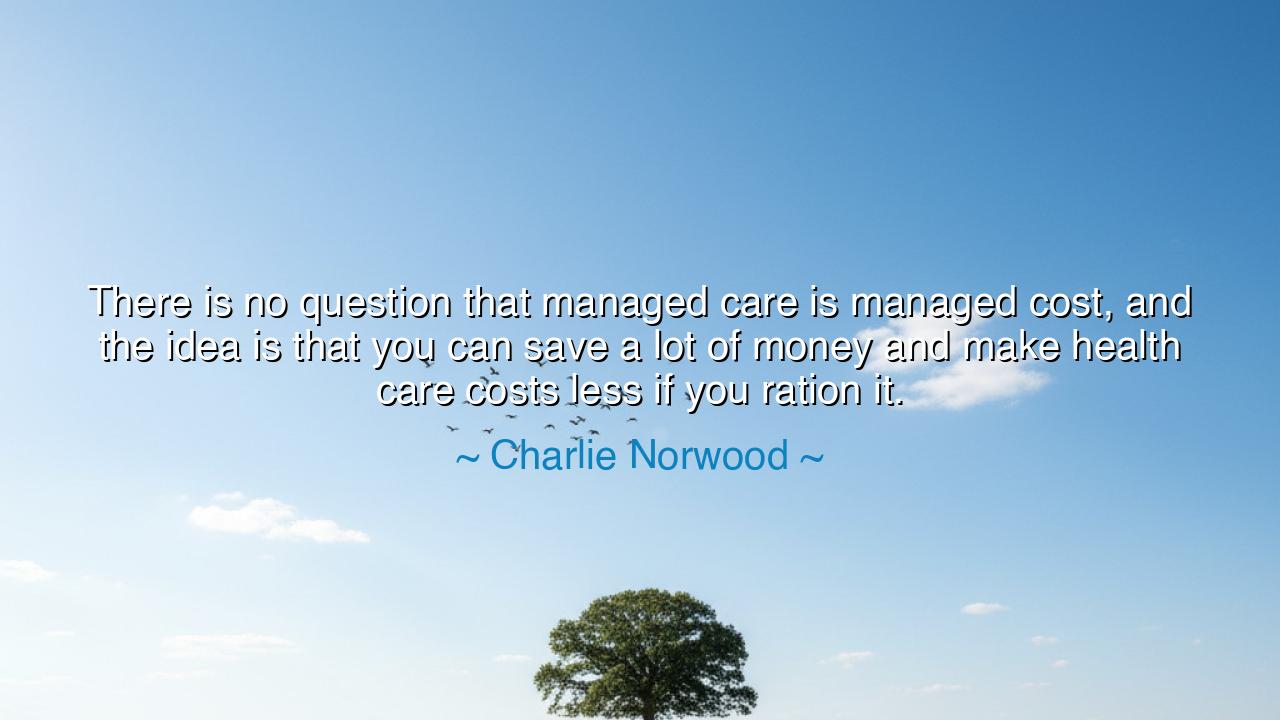
There is no question that managed care is managed cost, and the
There is no question that managed care is managed cost, and the idea is that you can save a lot of money and make health care costs less if you ration it.






Hearken, O children of generations yet unborn, and attend to the words of Charlie Norwood, who spoke with candor about the structure and consequences of health care: “There is no question that managed care is managed cost, and the idea is that you can save a lot of money and make health care costs less if you ration it.” In these words lies a reflection on economy, morality, and the tension between efficiency and human need, a lesson as profound today as the counsel of sages in the courts of kings.
Consider first the notion that managed care is managed cost. Norwood reminds us that systems designed to govern medicine are often shaped not purely by compassion, but by calculation. In ancient times, rulers and administrators faced similar dilemmas: how to distribute grain, water, or medicine among populations when resources were scarce. They discovered that management and rationing could preserve life in the aggregate, yet could also inflict suffering on individuals denied access. The principle is timeless: economy without wisdom can become cruelty.
The phrase “you can save a lot of money and make health care costs less if you ration it” carries both clarity and caution. Rationing, while practical in preserving the survival of the whole, imposes moral weight upon the one who decides who receives and who is deferred. History offers many such examples: during the great plagues of Europe, physicians and rulers were forced to allocate scarce medicine and care, choosing between lives with the tools and knowledge they had. These choices left indelible marks on conscience and society alike, reminding us that efficiency alone cannot measure justice or humanity.
Norwood’s observation also warns against the allure of cost-driven policies that neglect the human element. To reduce health care to numbers and budgets is to forget that every patient is a story, a family, a life. Ancient healers, from Hippocrates to Galen, understood that medicine is as much about judgment, care, and empathy as it is about resources. The management of cost without the management of compassion risks undermining the very purpose of healing.
Consider the story of Florence Nightingale, who transformed the management of hospitals during the Crimean War. While she implemented strict oversight and efficiency, her greatest achievement was preserving lives through compassion and attention to detail, not merely reducing cost. Nightingale’s legacy illustrates the principle Norwood evokes: the administration of health must balance economy with the sanctity of life.
From this reflection emerges a lesson: rationality and morality must walk together in the governance of health care. Cost-saving measures are not inherently wrong, but they demand scrutiny, foresight, and empathy. To ignore the human consequences of rationing is to risk turning stewardship into injustice. Every policy, like every decision in the halls of ancient kings, carries both immediate and lasting ethical implications.
Practical action flows naturally from this wisdom. Engage with health care decisions consciously, advocate for policies that balance efficiency with fairness, and support systems that prioritize both resource management and patient welfare. Study historical lessons, question assumptions, and remind those in power that behind every budget line is a human life. Wisdom in health care administration lies in harmonizing cost with care, calculation with conscience.
Finally, remember the eternal truth: the governance of life’s necessities has always demanded both prudence and humanity. Charlie Norwood’s words are a call to vigilance and reflection: to manage wisely, but never forget the sacredness of the lives entrusted to our care, for the measure of any society is found not in its savings, but in the lives it preserves and honors.
If you wish, I can also craft a narration-ready version of this reflection, with rises and falls that emphasize both the moral weight and practical insight of Norwood’s observation.






AAdministratorAdministrator
Welcome, honored guests. Please leave a comment, we will respond soon